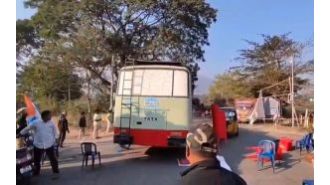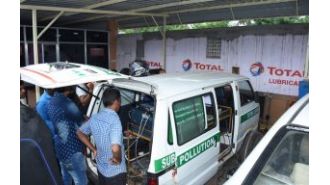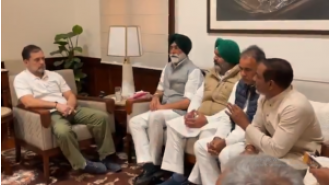Eight years after a fatal dam collapse, the victims are still seeking justice.
You never know when you'll see someone for the last time.

The catastrophic event in Minas Gerais, Brazil, on November 5, 2015, had a devastating impact on many lives. It was the day when the Mariana Dam collapsed, unleashing 50 million cubic meters of toxic waste towards small villages. The aftermath of the incident resulted in the loss of 19 lives and left indigenous communities in shambles.
For Pamela Isabel, it was just a regular day as she hurried to make it to her classes on time. Little did she know that the quick goodbye kisses she gave to her husband and two children, Emanuele and Nicholas, would be the last ones. The deafening noise of the dam collapse, which she heard from her classroom, was nothing short of terrifying. Panic and fear gripped her as she was unable to reach her family in the aftermath of the disaster. After spending a sleepless night on top of a hill, she was finally reunited with her husband and son, but the fate of her daughter, Emanuele, remained unknown.
The environmental disaster not only took innocent lives but also left many families displaced for weeks while alternative accommodation was arranged. Pamela's husband, Wesley, had to make a heartbreaking decision to let go of his children in order to save their lives. Despite their hopes of finding Emanuele alive, her lifeless body was discovered days later. The pain of losing her daughter was unbearable for Pamela, and she still struggles to come to terms with it.
Jonathan Knowles, a resident of Yorkshire, had a different story to tell. He moved to Brazil with his wife and young son, seeking a better life. Little did he know that the environmental devastation caused by the dam collapse would change their lives forever. Despite being provided with temporary support and psychological help, the family's life was never the same. Jonathan's wife, Sheila, suffered from trauma and anxiety, and their son was left with physical and emotional scars from the toxic mud.
As the years passed, Jonathan's hope for justice faded. But with the recent development of BHP being sued by over 700,000 plaintiffs, he sees a glimmer of hope. However, he knows that no amount of money can bring back the lives lost or erase the pain and suffering caused by the disaster.
The tragedy of Mariana Dam collapse is a reminder of the devastating consequences of corporate negligence. It not only destroyed homes and livelihoods but also shattered families and communities. As survivors continue to fight for justice, the memory of their loved ones lost in the disaster will always remain with them. Pamela still misses her daughter Emanuele, who used to bring smiles to everyone's faces. For Jonathan, Brazil will always hold the painful memories of a life-changing event that he never saw coming.
On November 5, 2015, a tragic event occurred in Minas Gerais, Brazil. The Mariana Dam collapsed, releasing 50 million cubic meters of toxic waste that swept through small villages. This disaster claimed the lives of 19 people and caused immense damage to the environment. Indigenous communities were particularly devastated, losing their homes, families, and livelihoods.
The dam was owned by a large Anglo-Australian company called BHP, which operated it through a subsidiary called Samarco. As a result of this disaster, more than 700,000 people have filed lawsuits against BHP, represented by the Pogust Goodhead law firm in UK courts. These plaintiffs include victims, Brazilian municipalities, indigenous communities, and churches. Even after almost 10 years, the survivors are still fighting for justice and sharing their stories of how the disaster changed their lives forever.
Pamela Isabel is one of the survivors who lost everything in the disaster. On that fateful day, she was rushing to get to her classes, three months pregnant and living with her husband Wesley and their two children, Emanuele and Nicholas. As she left for school, she gave a quick goodbye kiss to her family, not knowing it would be the last time she saw her daughter Emanuele.
Pamela vividly recalls the moment when the dam collapsed while she was in class. The noise was deafening, like heavy machinery grinding together at once. She was unable to reach her family that night and spent it on top of a hill with others, anxiously waiting for news. The ecological system was decimated, and families were displaced for weeks while they searched for accommodation.
When Pamela was finally reunited with her husband and son, Nicholas, she learned the heartbreaking truth about Emanuele. Wesley had tried to save their daughter by seeking shelter in a neighbor's house, but the mud was too strong. He had to make the difficult decision to let go of his children to save them. Nicholas was found a few days later, naked and crying in a car, but Emanuele's body was discovered five days after the disaster, seven and a half miles from their home.
The loss of Emanuele took a toll on Pamela and her family. BHP provided them with temporary housing and a credit card for basic necessities, as well as psychological help. But as time passed, the support from the company dwindled. Wesley turned to drugs and alcohol to cope with the pain of losing their daughter and has since been in and out of prison.
Pamela acknowledges that the lawsuit against BHP gives her hope, but no amount of money can bring back her daughter. She remembers Emanuele as a bright and cheerful girl who always made everyone smile. Doing things they used to do together, like fixing her hair or nails, brings back bittersweet memories of her little companion.
Another survivor, Jonathan Knowles, moved to Brazil with his wife Sheila and their young son. They were starting a new life together, but the disaster shattered their dreams. Jonathan, a Yorkshireman, had met Sheila in Harrogate, and they decided to move to Brazil for a fresh start. However, the collapse of the dam changed everything for them.
The tragedy of the Mariana Dam collapse is a reminder that justice must be served for the victims and their families. The survivors continue to fight for their rights, and the memories of their loved ones will always remain in their hearts.
7 Views










